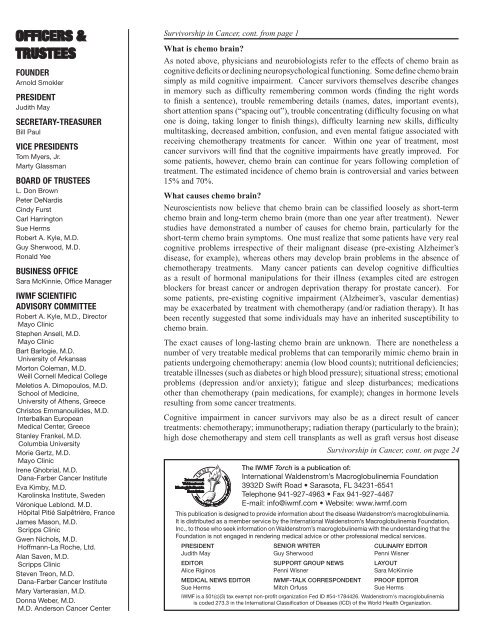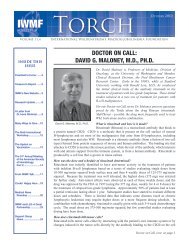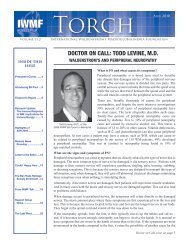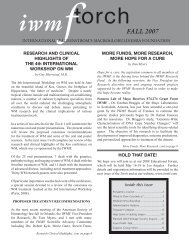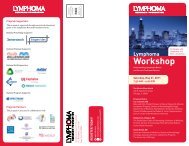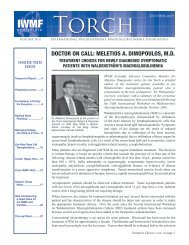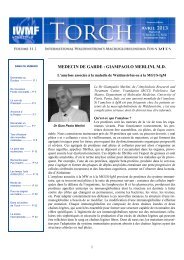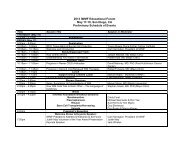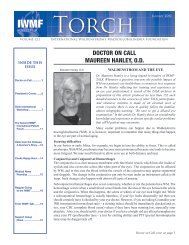SURVIVORSHIP IN CANCER - International Waldenstrom's ...
SURVIVORSHIP IN CANCER - International Waldenstrom's ...
SURVIVORSHIP IN CANCER - International Waldenstrom's ...
You also want an ePaper? Increase the reach of your titles
YUMPU automatically turns print PDFs into web optimized ePapers that Google loves.
OFFICERS &<br />
TRUSTEES<br />
FOUNDER<br />
Arnold Smokler<br />
PRESIDENT<br />
Judith May<br />
SECRETARY-TREASURER<br />
Bill Paul<br />
VICE PRESIDENTS<br />
Tom Myers, Jr.<br />
Marty Glassman<br />
BOARD OF TRUSTEES<br />
L. Don Brown<br />
Peter DeNardis<br />
Cindy Furst<br />
Carl Harrington<br />
Sue Herms<br />
Robert A. Kyle, M.D.<br />
Guy Sherwood, M.D.<br />
Ronald Yee<br />
BUS<strong>IN</strong>ESS OFFICE<br />
Sara McKinnie, Office Manager<br />
IWMF SCIENTIFIC<br />
ADVISORY COMMITTEE<br />
Robert A. Kyle, M.D., Director<br />
Mayo Clinic<br />
Stephen Ansell, M.D.<br />
Mayo Clinic<br />
Bart Barlogie, M.D.<br />
University of Arkansas<br />
Morton Coleman, M.D.<br />
Weill Cornell Medical College<br />
Meletios A. Dimopoulos, M.D.<br />
School of Medicine,<br />
University of Athens, Greece<br />
Christos Emmanouilides, M.D.<br />
Interbalkan European<br />
Medical Center, Greece<br />
Stanley Frankel, M.D.<br />
Columbia University<br />
Morie Gertz, M.D.<br />
Mayo Clinic<br />
Irene Ghobrial, M.D.<br />
Dana-Farber Cancer Institute<br />
Eva Kimby, M.D.<br />
Karolinska Institute, Sweden<br />
Véronique Leblond. M.D.<br />
Hôpital Pitié Salpêtrière, France<br />
James Mason, M.D.<br />
Scripps Clinic<br />
Gwen Nichols, M.D.<br />
Hoffmann-La Roche, Ltd.<br />
Alan Saven, M.D.<br />
Scripps Clinic<br />
Steven Treon, M.D.<br />
Dana-Farber Cancer Institute<br />
Mary Varterasian, M.D.<br />
Donna Weber, M.D.<br />
M.D. Anderson Cancer Center<br />
Survivorship in Cancer, cont. from page 1<br />
What is chemo brain?<br />
As noted above, physicians and neurobiologists refer to the effects of chemo brain as<br />
cognitive deficits or declining neuropsychological functioning. Some define chemo brain<br />
simply as mild cognitive impairment. Cancer survivors themselves describe changes<br />
in memory such as difficulty remembering common words (finding the right words<br />
to finish a sentence), trouble remembering details (names, dates, important events),<br />
short attention spans (“spacing out”), trouble concentrating (difficulty focusing on what<br />
one is doing, taking longer to finish things), difficulty learning new skills, difficulty<br />
multitasking, decreased ambition, confusion, and even mental fatigue associated with<br />
receiving chemotherapy treatments for cancer. Within one year of treatment, most<br />
cancer survivors will find that the cognitive impairments have greatly improved. For<br />
some patients, however, chemo brain can continue for years following completion of<br />
treatment. The estimated incidence of chemo brain is controversial and varies between<br />
15% and 70%.<br />
What causes chemo brain?<br />
Neuroscientists now believe that chemo brain can be classified loosely as short-term<br />
chemo brain and long-term chemo brain (more than one year after treatment). Newer<br />
studies have demonstrated a number of causes for chemo brain, particularly for the<br />
short-term chemo brain symptoms. One must realize that some patients have very real<br />
cognitive problems irrespective of their malignant disease (pre-existing Alzheimer’s<br />
disease, for example), whereas others may develop brain problems in the absence of<br />
chemotherapy treatments. Many cancer patients can develop cognitive difficulties<br />
as a result of hormonal manipulations for their illness (examples cited are estrogen<br />
blockers for breast cancer or androgen deprivation therapy for prostate cancer). For<br />
some patients, pre-existing cognitive impairment (Alzheimer’s, vascular dementias)<br />
may be exacerbated by treatment with chemotherapy (and/or radiation therapy). It has<br />
been recently suggested that some individuals may have an inherited susceptibility to<br />
chemo brain.<br />
The exact causes of long-lasting chemo brain are unknown. There are nonetheless a<br />
number of very treatable medical problems that can temporarily mimic chemo brain in<br />
patients undergoing chemotherapy: anemia (low blood counts); nutritional deficiencies;<br />
treatable illnesses (such as diabetes or high blood pressure); situational stress; emotional<br />
problems (depression and/or anxiety); fatigue and sleep disturbances; medications<br />
other than chemotherapy (pain medications, for example); changes in hormone levels<br />
resulting from some cancer treatments.<br />
Cognitive impairment in cancer survivors may also be as a direct result of cancer<br />
treatments: chemotherapy; immunotherapy; radiation therapy (particularly to the brain);<br />
high dose chemotherapy and stem cell transplants as well as graft versus host disease<br />
PRESIDENT<br />
Judith May<br />
EDITOR<br />
Alice Riginos<br />
MEDICAL NEWS EDITOR<br />
Sue Herms<br />
The IWMF Torch is a publication of:<br />
<strong>International</strong> Waldenstrom’s Macroglobulinemia Foundation<br />
3932D Swift Road • Sarasota, FL 34231-6541<br />
Telephone 941-927-4963 • Fax 941-927-4467<br />
E-mail: info@iwmf.com • Website: www.iwmf.com<br />
This publication is designed to provide information about the disease Waldenstrom’s macroglobulinemia.<br />
It is distributed as a member service by the <strong>International</strong> Waldenstrom’s Macroglobulinemia Foundation,<br />
Inc., to those who seek information on Waldenstrom’s macroglobulinemia with the understanding that the<br />
Foundation is not engaged in rendering medical advice or other professional medical services.<br />
SENIOR WRITER<br />
Guy Sherwood<br />
SUPPORT GROUP NEWS<br />
Penni Wisner<br />
IWMF-TALK CORRESPONDENT<br />
Mitch Orfuss<br />
Survivorship in Cancer, cont. on page 24<br />
CUL<strong>IN</strong>ARY EDITOR<br />
Penni Wisner<br />
LAYOUT<br />
Sara McKinnie<br />
PROOF EDITOR<br />
Sue Herms<br />
IWMF is a 501(c)(3) tax exempt non-profit organization Fed ID #54-1784426. <strong>Waldenstrom's</strong> macroglobulinemia<br />
is coded 273.3 in the <strong>International</strong> Classification of Diseases (ICD) of the World Health Organization.


